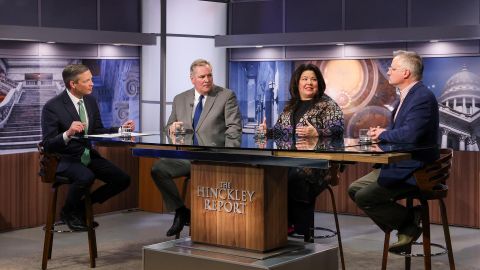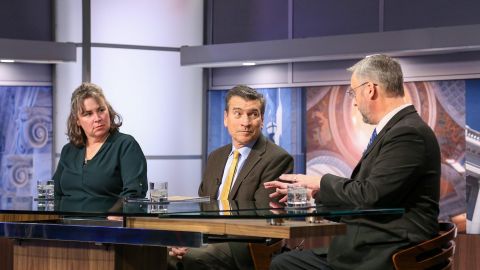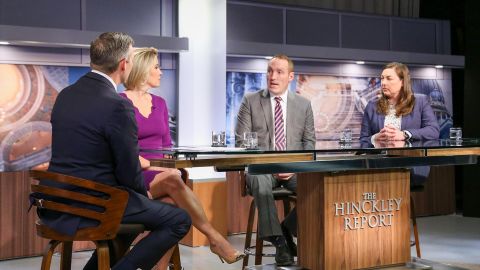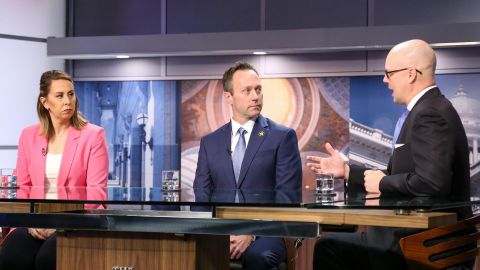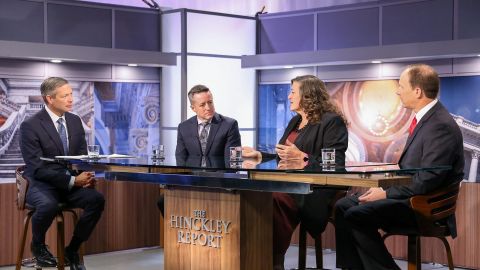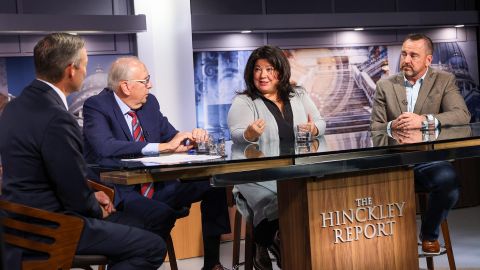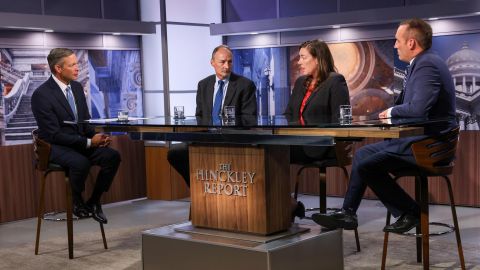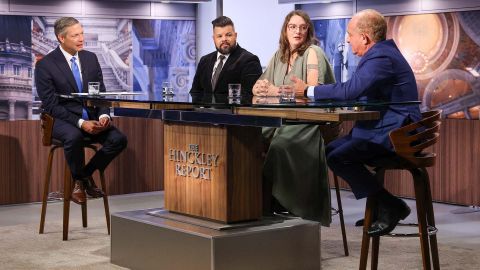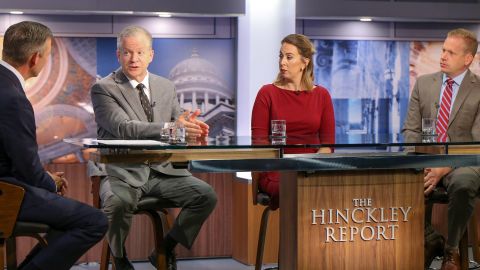announcer: Funding for "The Hinckley Report" is made possible in part by the Cleone Peterson Eccles Endowment Fund.
Morgan Lyon Cotti: Tonight on "The Hinckley Report."
Steve Womack: The office of Speaker of the House of the United States House of Representatives is hereby declared vacant.
Morgan Lyon Cotti: Utah's leaders react to the dramatic removal of Speaker McCarthy.
Congress votes to narrowly avoid a government shutdown as leaders work against a new deadline.
And a big announcement shakes up the race for Utah's open Senate seat.
♪♪♪ ♪♪♪ Morgan Lyon Cotti: Good evening, and welcome to "The Hinckley Report."
I'm Morgan Lyon Cotti, associate director of the Hinckley Institute of Politics, filling in for Jason Perry.
Covering the week we have Taylor Morgan, partner with Morgan and May Public Affairs; Marjorie Cortez, reporter with the Deseret News; and Glen Mills, former political reporter.
So, there's no lack of news or dramatics or anything this week.
Glen Mills: A few things happening during the week.
Morgan Lyon Cotti: A little bit, national level and at the state level.
And of course, the biggest news is that for the first time in our nation's history, the Speaker of the House is vacated.
Congress voted, very close vote to 216 to 210.
None of Utah's delegation voted in favor of this, however, made closer by the fact that Congressman Stewart's office is vacant.
But Glen, I want to start with you here.
I want to get your general take on this, what this means for our nation, what this means for our state.
Glen Mills: Wow, what an unprecedented event we watched unfold during the week.
We've gotten to the point where the "Real Housewife" series has nothing on Congress anymore.
As you take a look at how that went down, next-level drama playing out in the nation's capital.
There's really one point I want to start off with on this whole thing, and that is the deep irony of what took place.
Many may call it hypocrisy.
And that is the simple fact that Representative Matt Gaetz and his crew wanted to oust Speaker McCarthy because he chose to govern and work with Democrats to avoid a shutdown.
Now, for them to be successful to get McCarthy out, wait for it, they had to work with all the Democrats in the House to make that happen.
Just really as you take a look at that, just an incredible irony.
Taylor Morgan: Yeah, I'll just add that I wanna celebrate this dysfunction a little bit.
We know that our founding fathers set up the checks and balances among the branches, but also within the branches.
Ambition must be made to counteract ambition.
And certainly we would like Congress to work, but I also appreciate some dysfunction in D.C. Glen, you're right.
The Democrats deserve some blame in this, but ultimately, this came down to Speaker Kevin McCarthy being a very poor leader.
After working with the Democrats, he could not win their support to keep his seat as Speaker.
Morgan Lyon Cotti: And Marjorie, I want to get your take on this, because Congressman John Curtis said something about the dysfunction and about what's going on with Democrats and Republicans.
He said, "Congress set a new low today.
Republicans turning on Republicans and Democrats standing around with lighter fluid and matches.
No one's interest was served with the removal of Kevin McCarthy.
I stand ready to work with any reasonable member of Congress to put this back together again and work on the real problems of our day."
What's the congressman saying here?
Marjorie Cortez: Well, I think he's referring to just this fatigue we all have with Congress.
Get something done, for crying out loud.
And there's all this gamesmanship going on, and then now the Speaker has been ousted.
And meanwhile, there's still pressing problems in our country that need to be addressed like immigration and making sure that the most vulnerable people in our country, that their needs are taken care of.
And I think a lot of Americans are just like, you know, get 'er done.
Morgan Lyon Cotti: Glen?
Glen Mills: Well, Representative Moore from our congressional delegation also had a very strong statement coming out against this action.
And he basically said, paraphrasing here, this had nothing to do with Speaker McCarthy and everything to do with representative Gaetz's insatiable need for attention.
Morgan Lyon Cotti: And this is something that we're hearing more commentary about that.
There's less legislating, there's more social media, there's even less legislative staff and more coms staff on these congressional staffers.
Taylor is someone who's worked in politics and policy.
What is--and also someone who is a communications person.
How does the general public read all of this?
Taylor Morgan: Well, I think the public is frustrated with Congress, and rightly so.
We also saw during the vote to vacate the speakership, we saw a flurry of political fundraising-- text messages and emails.
Republicans, particularly in their campaigns and their communications teams, have ramped up political fundraising on this behavior in Congress to a level that is unprecedented.
Certainly, this is nothing more than a campaign stunt.
It's this political theater, and Americans are growing tired of it.
But to my previous point, I think some dysfunction is healthy, but probably not to this degree.
Glen Mills: One other thing that's important to point out here is that this is a consequence of what you have when one party has such a small majority in the House of Representatives.
What that allows for is for the fringe, or the more extreme, members of that party to take control of the situation exactly like we saw play out in this one.
Marjorie Cortez: And we saw that with the speaker vote as well.
Taylor Morgan: Right, yeah, that's exactly right.
There was a time over the last few days when many thought Donald Trump would step in and be elected as the next Speaker of the House.
You don't have to be in Congress to be the Speaker, technically, constitutionally.
That would have been fun.
Glen Mills: Yeah, that is looking unlikely at this point, but wouldn't that have been the ultimate "be careful what you wish for" moment for the Democrats in that situation?
Morgan Lyon Cotti: Yeah, Taylor, I want to get your take also on something that former Governor Herbert said this week.
Your career, you've worked in nonpartisan spaces, bipartisan spaces, even as a Republican campaigner and consultant you work with Democrats, and he said, "We used to define those on the other side of the aisle as the loyal opposition.
Today they are more often referred to and treated as the disloyal enemy."
What are your thoughts on that?
Taylor Morgan: Yeah, we tend to take politics far too personally.
We need to be able to disagree and disagree, you know, passionately on the issues, on policies, but then walk away from the policy debate and still be positive and friendly and be humans and treat each other with respect.
Politics has become far too divisive in an ugly, personal way, and that was never the intention of this process.
Morgan Lyon Cotti: Yeah, and Marjorie, what are you seeing with your reporting over the years?
How is this affecting our state?
Marjorie Cortez: Well, I was thinking back to when Ronald Reagan was president, and he and Tip O'Neill would meet at the end of the day and have a cocktail and talk about what had happened that day.
And there was this collegiality that we don't see now, which I think is really tragic, because, you know, everyone has their political agendas and trying to do the best to represent the people they're representing.
But at the end of the day, things have to get done.
And I think that's what is-- most Americans struggle with.
It's just, you know, here's this Republican president and Democratic leader who could, you know, put down the weapons at the end of the day and chat, and that's really what we're missing now, is opportunities just to communicate as people.
Taylor Morgan: Can I add something to that?
I think that's such a great point.
We see in Congress, when we talk about statesmanship, we think Mitch McConnell, we think some of the more senior members of Congress.
Certainly Mitt Romney.
I have to wonder if Nancy Pelosi was minority leader instead of Hakeem Jeffries, would this have happened?
Would the Democrats all have voted as a block to vacate Kevin McCarthy as speaker?
I feel like this younger generation maybe needs to learn some statesmanship.
Marjorie Cortez: Well, I remember Orrin Hatch, you know, working with Teddy Kennedy to pass the children's health insurance plan or program.
And those kinds of bipartisan efforts were possible because people could meet each other as human beings.
Morgan Lyon Cotti: And one thing that is good to remember about all of this is that the Speaker of the House is not just a position of power.
Well, it's not just a position that gets a microphone, it is actually an actual constitutional position.
It's second in line to the presidency just behind the vice president.
There's a lot of business to get done, Marjorie, you already mentioned immigration, but we also have another budget showdown coming up.
Congress voted to keep government running.
They did go over their deadline by a couple of days, but government is currently open.
Glen, can you just--as we start talking about the budget shutdown, still tell us a little bit about this dynamic of what it means that they're going to be electing a new speaker and also have less than 40 days to pass a new budget?
Glen Mills: Well, one, I wonder if they're going to be effective in electing a new speaker.
We saw how it all played out the first time.
Is that going to happen again?
Will they even be able to do that?
Will it sit vacant for months?
At this point we really don't know how that will play out.
And as you mentioned, it's a very important position as we get into this because essentially what they did is they bought themselves some time, and I believe it's November 17 is the new deadline to come to an agreement.
So, we've seen our own senator, Mike Lee, talk about how there's no viable plan being talked about in the Senate right now, so a lot of this is really up in the air, and we're wondering what's going to happen when that deadline comes around again in just a couple of weeks?
Morgan Lyon Cotti: And with Senator Lee, he's made comments last week.
He tweeted out that we needed a 15-day government shutdown to stop the spread of government spending.
Marjorie, I'd love to hear your take.
Is there an appetite from Utahns to have a short government spending to try to get deeper into these negotiations, perhaps for the Conservatives, and to curtail some of that government spending?
Marjorie Cortez: Well, Utahns are fiscally responsible people.
They want Congress to spend that tax dollar they're sending them, they want them to do good things with that.
But if we--this means another government shutdown, I think Utahns are, you know, look at our congressional district.
They don't want that, they-- Morgan Lyon Cotti: Yeah, and Glen, I know you've done reporting on this, especially with those IRS employees.
Glen Mills: Yeah, at times we've had shutdowns.
I have met with IRS employees, you know, it's a huge employer in Ogden.
We have a lot of federal workers in our state, and these are people, in many instances, that are living paycheck to paycheck.
They really depend on that money coming in, and when it doesn't, it has real-life consequences on them.
So, I've had an opportunity to go see how it impacts them, and it really is frustrating for them, it's something they really worry about, and it impacts their life, especially when you're talking about it coming up, potentially, up against the holidays this year.
It adds that additional stress.
Morgan Lyon Cotti: And Marjorie, who are--I know you've spoken in the past about that vulnerability spectrum, that there are those who really rely on some of these government programs.
Can you tell us a little bit about that?
Marjorie Cortez: I mean, we have kind of this vulnerability spectrum where children are highly vulnerable, infants, people with very low incomes, children who attend Title One schools, and then we have this on the other end when people are seniors or veterans or people with disabilities.
Of course, that could be anywhere in the spectrum.
But when government shuts down, those are the kinds of programs that I think we have great concern about, like WIC.
And, you know, I--my mom's on social security.
I'm pretty sure she's still gonna get her check, but we worry about that because these are essential services they rely on.
Morgan Lyon Cotti: And Taylor, while we do need to talk about the logistics of a government shutdown, there's also the political ramifications.
We have a special election in Utah, we're coming up on a presidential and a senate election next year.
How do voters read this?
What are they concerned about?
Taylor Morgan: I think voters, typically, voters will send the attack dogs to Washington, D.C. We tend to elect more moderate, you know, folks to lead our state government and to be in the office of governor.
We tend to send maybe more of the attack dogs like Senator Mike Lee to Washington, D.C., because we're frustrated with how D.C. works.
However, that said, voters in Utah want fiscal discipline, but I really think that they're growing so tired of the dysfunction in D.C. That will have an impact on the upcoming Senate race.
We haven't had an open Senate seat in Utah since 1976.
Voters will have a key opportunity to define the representation for Utah and the tone in the United States Senate on behalf of Utah going forward for decades.
Morgan Lyon Cotti: And we should say technically it was an open Senate seat in 2018, but Mitt Romney's name ID was so much that it didn't feel like it.
Well, before we get to that though, in the past, there's really been blame when it comes to government shutdowns.
And you can even look at elections to see if it hurt one party or the other.
With Republicans, are voters-- Glen, do you think voters are blaming the Republicans in Congress?
Are they blaming the Democrats in the Senate?
Are they blaming everybody?
Glen Mills: I haven't seen any polling data on that recently, but I think there's probably blame to go around in this situation.
Again, I'll make note of the very slim majorities in both chambers, and so there's probably a sense of--from voters that both parties are not doing what they could to come together and try to make this happen.
Morgan Lyon Cotti: So, I wanna move on to our upcoming Senate race.
As we've mentioned, Mitt Romney has been in this seat for just one term, and he's not running again.
And a lot of people were looking at Congressman John Curtis, and there had been rumors, there had been hints, they thought he'd been making--he would be making an announcement.
But Glen, this week he said he is not going to run.
Were you surprised by this?
Glen Mills: I was, because I originally heard that he was out and he wasn't going to run, then I heard, yes, he is going to be in, and then he came out and made it official, "No, I'm not."
I thought that seat might be tempting to him or attractive to him in the fact that he wouldn't have to run every two years, that would be every six years instead.
There's a lot of sense that maybe you can get more done in the Senate.
But I talked to one of his staffers and--to try to get a sense of what he was thinking and what played into this decision, and they told me two things.
One, he does feel a sense of fulfillment with what he's able to accomplish in the House for his district.
And two, a sense of loyalty to the people that have sent him to Congress a couple times over now, he's really loyal to them.
He wants to stick with the job that he started, and he does feel like he can be as effective in the House.
Taylor Morgan: If I can add something there, as a campaign strategist, I have to give a ton of credit to Brad Wilson and to his team for freezing out the field in this Senate race.
Brad Wilson has far lower name ID statewide than John Curtis would have had as a member of Congress with a district that spans the state.
However, Brad Wilson got the key donors.
We're talking the Gail Millers, we're talking former governor Mike Leavitt, we're talking Ken and Carolyn Gardner, the who's who of Utah's political donors all were locked in early by Brad Wilson as endorsers and supporters.
And I believe that frees the field and that scared off Congressman John Curtis from challenging him in the race.
Marjorie Cortez: I thought it was interesting that he announced in Draper, which I thought was kind of a maybe a little snub to the mayor, Trent Staggs, who's running.
And not in that he didn't announce in Davis County where he's from or by the lake, you know.
I mean, maybe he wanted to be there because it's close to Utah County and there are voters to court there as well.
But I thought that that was very strategic.
Taylor Morgan: As a Draper resident, I have to say that's because Draper is the political power center of Utah.
Glen Mills: Also as a Draper resident, I'll have to go ahead and back that statement.
Marjorie Cortez: I'm from Millcreek, don't know from where I speak.
Glen Mills: I wanna make one more point on that.
If you look back over the last several years, the state legislature has not been a path to Congress.
I can name state legislator after state legislator who tried and failed to make that--to bridge those two organizations.
Brad Wilson though, you can clearly tell is positioned different than a lot of the people who have tried in the past though, by--because of what you have mentioned.
He's raised a lot of money and he has got those big names to come out behind him.
Just next week there's going to be a fundraiser held for him sponsored by Governor Cox, Gail Miller, Scott Anderson, and so he's got a lot of that backing behind him.
And so, it's a very different looking attempt this time around from other previous state lawmakers who have tried to make that jump.
Marjorie Cortez: Plus, he has a lot of personal resources, and that helps too.
Morgan Lyon Cotti: So, with his early announcement, those early resources, with Congressman Curtis not stepping in, are there any other names that we haven't been talking about that we should be talking about?
Glen Mills: One I'll throw into the ring I know is considering would be Thomas Wright.
He's a successful local businessman, someone who also has the resources personally to make a run.
He ran for governor in 2020 as well, former Utah GOP chair, and as I mentioned, a successful businessman locally.
I haven't heard a lot of talk about that, but I do know he is considering.
Morgan Lyon Cotti: We also heard this week through a spokesperson that Josh Romney wouldn't be running.
Marjorie, were people expecting him to run?
Marjorie Cortez: I think no.
I mean, that was--I think there was a lot of chatter about that, but I don't know that he was seriously thinking about doing that at this time.
I mean, in the future.
Glen Mills: I don't know that he ever considered that seriously, but it's just a--it's a good story, a good narrative that people want to jump to.
Marjorie Cortez: We love our family stories.
Morgan Lyon Cotti: We do.
Okay, also in 2024, as we all know, we're going to have another presidential election, and we have a new poll coming out with--through the Dan Jones Center at the U of U at the Hinckley Institute with the Deseret News, and we are asking voters what do you think about all of these Republican candidates?
And we have seen a really interesting trend over the last year.
Last year Ron DeSantis was leading the field with about 33%, and Donald Trump was in the low 20s, and we have seen a reversal of that in our latest poll.
Donald Trump is at 33%, and Ron DeSantis has fallen to 15% among Republicans that we polled.
Taylor, as the Republican campaigner here, what's happening with these voters?
Taylor Morgan: Well, Governor Ron DeSantis's campaign just has never caught on.
We saw last year, we saw a letter from 100 Republican elected officials throughout Utah specifically calling for Ron DeSantis to run for the presidency.
And now fast forward to this year, very few of them probably would say they would vote for him because his campaign has been such a failure.
Ron DeSantis has not found any separation or any traction with voters.
Voters don't really know who Ron DeSantis is and why they should vote for him anymore even though he just won Florida by a landslide, a historic landslide, the Florida governorship.
Nikki Haley, however, appears to have some support here.
But really, I think the biggest surprise of these latest numbers is how much support Donald Trump has again in Utah among Utah Republicans.
Morgan Lyon Cotti: Right.
Yeah, Glen.
Glen Mills: We've just been saying for a long time plurality is going to favor the former president.
It's just a fact.
We're seeing that play out.
In that Utah poll there are still more voters voting against him than voting for him, and there's a huge number of undecideds in that poll as well.
But we know the more people that stay in that race, that is going to benefit the former president.
That's why we saw our Senator, Senator Romney, come out and make a suggestion or a plan, you know, if we get to a certain point, he's trying to encourage a lot of those other candidates to go ahead and drop out and get behind the one that could potentially challenge him the best in a primary.
Morgan Lyon Cotti: And that was an echo of the speech he gave in 2016 at the Hinckley Institute calling on those Republicans to do that as well.
Marjorie, are we going to see people try to drop and rally around another candidate?
Marjorie Cortez: I'm not sure at this point.
I mean, I think part of Trump's juice right now is he's been running for president for three years.
I mean, seriously, since he lost, he hasn't given up.
I think it's interesting how much traction Nikki Haley is getting, and I think she's performed well in debates.
I think she has foreign policy experience, which is really important in this kind of dangerous world we're living in right now.
And I think maybe when push comes to shove, people will want somebody who's more serious and wants to govern.
Taylor Morgan: I think that, well, let me just say this really quickly.
I think the economy is very, very frustrating for voters.
And I believe the economy is going to really be the key issue in this election.
There will be many voters who did not vote for Donald Trump in 2020 because of bad behavior, because of his personal character flaws.
I believe many of those voters will plug their nose and vote for former president Trump because of the economy.
Morgan Lyon Cotti: Narrative we've heard before.
Glen Mills: I was just gonna add one other thing, when you talk about this strategy of jumping out of the race and getting behind a candidate who can be more successful, we did see the Democrats figure that out in 2020 within their own ranks.
Bernie Sanders was really doing well in the race, Joe Biden was struggling to reach him, and we saw Pete Buttigieg and Senator Klobuchar both come together and say, "Look, we need to get out of the this race and back President Biden," and you saw the trajectory of that race change once that happened.
An interesting note, I was in the room with Bernie Sanders when he received the call that Buttigieg and Klobuchar were backing out.
He went white as a ghost.
I had to leave the room for a minute.
Taylor Morgan: Whiter than normal?
Glen Mills: Yeah, well, hey, that tells you the impact that that had on him.
But he knew instantly the impact that that was going to have on him.
It was when he did his rally out at the state fair, and I was interviewing him at a hotel.
But I had to leave the room for a minute, and I was able to come back in, and he didn't tell me what had happened, but as soon as I heard the news, I knew that was that moment.
Morgan Lyon Cotti: Very interesting, we'll have to watch and see what these candidates will do.
With our last couple of minutes, I want to get to another poll question that we asked.
There's so much conversation about the age of these presidential candidates.
You just mentioned Bernie Sanders, Donald Trump, Joe Biden, in the past Hillary Clinton, at any other time, they would have--it would have been historic even them alone as an oldest candidate.
So we Utah voters, do you think there should be a maximum age for elected officials?
And this has, of course, been in the news for members of the US Senate as well, and nearly two thirds of Utahns say, yes, they think there should be a maximum age.
And about half of those say it should be 70.
Marjorie, what are you hearing from voters?
What are you seeing in politics with this appearance of frustration over the age of these candidates?
Marjorie Cortez: Well, I mean, I think there were so many people that respected what Mitt Romney did.
You know, let's hand this to a next generation.
And I personally found it painful to watch Dianne Feinstein come unspooled in the past few months because there does come a time when you have to step aside.
But I think that power becomes so addictive that it's really hard to do that.
And I remember when the pope stepped down and I kept telling my husband, well, this doesn't happen.
The pope serves for the lifetime.
And I remember him saying something like--because that's a very Germanic thing to do, is is to step aside when you don't feel like you're being productive or you can help an organization along.
Taylor Morgan: It's so difficult though, because power in Washington, D.C., and especially in Congress, is tied directly to seniority.
And Utah really benefited from having former senator, the late Senator Orrin Hatch be in D.C. for so long.
He rose to power with that seniority, ultimately was chair of the finance committee.
He had a lot of pull, and he got a lot of things for Utah in that position.
We miss that seniority.
Morgan Lyon Cotti: We're gonna have to continue this discussion another time.
Thank you all for being with us, and thank you for watching "The Hinckley Report."
This show is also available as a podcast on PBS.org/HinckleyReport or wherever you get your podcasts.
Thank you for being with us, and we'll see you next week.
♪♪♪ ♪♪♪







